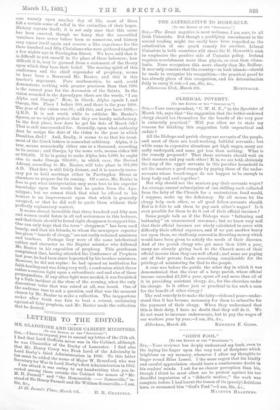CLERICAL POVERTY.
[TO TH10 EDITOR. Or THE "SPECTATOR,"]
Sin,—Your correspondent, "C. W. H. K.," in the Spectator of March 4th, says that" the suggestion that the better-endowed clergy should tax themselves for the benefit of the very poor is eminently practical." Will you allow me to state my reasons for thinking this suggestion both unpractical and unfair ?
All the Bishops and parish clergy are servants of the people, and most of them are hard-working, faithful servants ; but while some in expensive situations get high wages, many are sadly underpaid, and some get less than nothing. What is the remedy proposed P That these servants should wait on their masters and pay each other ! It is, we are told, obviously the duty of the upper servants in this peculiar household to set the masters a good example by paying those of the under- servants whose board-wages do not happen to be enough to keep body and soul together !
But why should not the masters pay their servants wages ? An average annual subscription of one shilling each collected from the laity of the Church for a sustentation fund would, I suppose, make up the deficiency. By all means let the clergy help each other, as all good fellow-servants should. Bat is it fair to ask them to pay each other's wages P Is it even possible for them to do it out of their official incomes
Some people talk as if the Bishops were "fattening and battening" on unmeasured revenues ; but we know very well that their official incomes are nicely calculated to cover with difficulty their official expenses, and if we put another heavy tax upon them, we shall only succeed in diverting money which would have been given to satisfy the needs of their dioceses. And of the parish clergy who get more than 2500 a year, many are already giving back to the Church more of their official income than they can well afford ; and some are paying out of their private funds something considerable for the privilege of ministering for God to the people.
A case was before the public the other day in which it was demonstrated that the vicar of a large parish, whose official income exceeded 21,100 a year, spent all and more than all of it in providing assistant clergy, Sm., for the churches under his charge. Is it either just or practical to tax such a man for the benefit of other clergy?
The real remedy is to make the laity—rich and poor—under- stand that it has become necessary for them to subscribe for the payment of their clergy. When they understand that this is their duty, I have no doubt that they will do it. We do not want to increase endowments, but to pay the wages of our workers year by year.—I am, Sir, &c.,


































 Previous page
Previous page